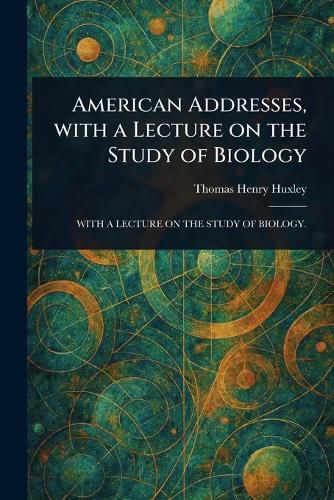Readings Newsletter
Become a Readings Member to make your shopping experience even easier.
Sign in or sign up for free!
You’re not far away from qualifying for FREE standard shipping within Australia
You’ve qualified for FREE standard shipping within Australia
The cart is loading…






This title is printed to order. This book may have been self-published. If so, we cannot guarantee the quality of the content. In the main most books will have gone through the editing process however some may not. We therefore suggest that you be aware of this before ordering this book. If in doubt check either the author or publisher’s details as we are unable to accept any returns unless they are faulty. Please contact us if you have any questions.
Explore the foundations of modern biology with Thomas Henry Huxley's "American Addresses, with a Lecture on the Study of Biology." This collection of essays and addresses provides a fascinating glimpse into the scientific thought of the 19th century, focusing on the principles of biology and the importance of science education. Huxley, a prominent advocate for evolution, addresses key concepts using the scientific method, making complex ideas accessible to a broad audience.
This volume meticulously examines the study and teaching of biology, offering insights into Huxley's influential perspectives on the life sciences. Delve into thought-provoking reflections on scientific inquiry and the enduring relevance of biological principles. A vital resource for anyone interested in the history of science and the development of evolutionary thought.
This work has been selected by scholars as being culturally important, and is part of the knowledge base of civilization as we know it.
This work is in the public domain in the United States of America, and possibly other nations. Within the United States, you may freely copy and distribute this work, as no entity (individual or corporate) has a copyright on the body of the work.
Scholars believe, and we concur, that this work is important enough to be preserved, reproduced, and made generally available to the public. We appreciate your support of the preservation process, and thank you for being an important part of keeping this knowledge alive and relevant.
$9.00 standard shipping within Australia
FREE standard shipping within Australia for orders over $100.00
Express & International shipping calculated at checkout
Stock availability can be subject to change without notice. We recommend calling the shop or contacting our online team to check availability of low stock items. Please see our Shopping Online page for more details.
This title is printed to order. This book may have been self-published. If so, we cannot guarantee the quality of the content. In the main most books will have gone through the editing process however some may not. We therefore suggest that you be aware of this before ordering this book. If in doubt check either the author or publisher’s details as we are unable to accept any returns unless they are faulty. Please contact us if you have any questions.
Explore the foundations of modern biology with Thomas Henry Huxley's "American Addresses, with a Lecture on the Study of Biology." This collection of essays and addresses provides a fascinating glimpse into the scientific thought of the 19th century, focusing on the principles of biology and the importance of science education. Huxley, a prominent advocate for evolution, addresses key concepts using the scientific method, making complex ideas accessible to a broad audience.
This volume meticulously examines the study and teaching of biology, offering insights into Huxley's influential perspectives on the life sciences. Delve into thought-provoking reflections on scientific inquiry and the enduring relevance of biological principles. A vital resource for anyone interested in the history of science and the development of evolutionary thought.
This work has been selected by scholars as being culturally important, and is part of the knowledge base of civilization as we know it.
This work is in the public domain in the United States of America, and possibly other nations. Within the United States, you may freely copy and distribute this work, as no entity (individual or corporate) has a copyright on the body of the work.
Scholars believe, and we concur, that this work is important enough to be preserved, reproduced, and made generally available to the public. We appreciate your support of the preservation process, and thank you for being an important part of keeping this knowledge alive and relevant.